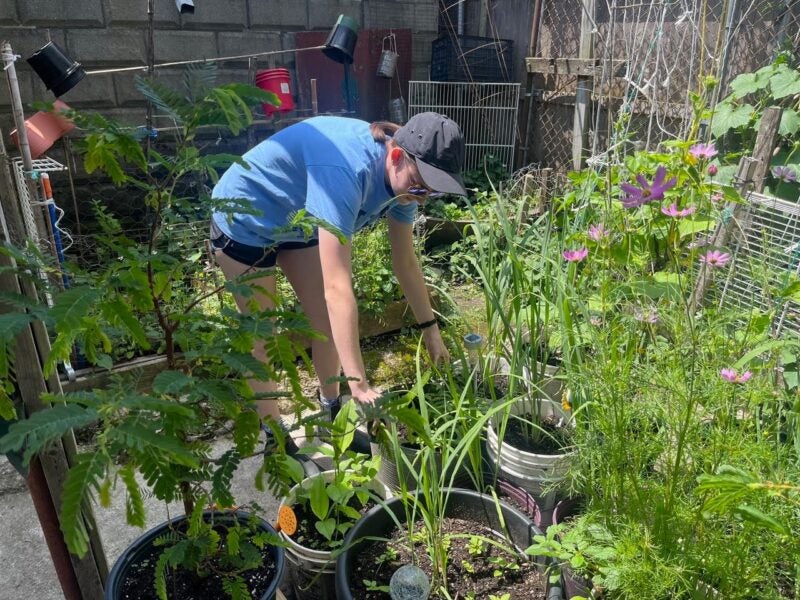Impact-oriented, collaborative, experiential learning is at the heart of the University of Rhode Island. With this focus, faculty and students are excited about research that serves the larger community. One duo brought together through the College of the Environment and Life Sciences (CELS) exemplifies this mission: Professor of Agroecology John Taylor and undergraduate student Caroline McCullough. Now a junior majoring in sustainable agriculture and food systems (SAFS) with a minor in film, McCullough completed a Coastal and Environmental Fellowship this past summer under the mentorship of Taylor, assisting in his research on food sovereignty and alternative food networks among immigrant communities.
Referring to all people’s right to healthy, culturally appropriate food, food sovereignty is closely intertwined with the idea of food security–the ability for people to have access to adequate, nutritionally dense food–and is a major determining factor in overall health. As McCullough explains, it’s more than just a lack of access to food in general. “Just because you have food doesn’t mean you aren’t food insecure,” she says. “Food insecurity doesn’t just mean a lack of access to food, but it means a lack of access to fulfilling, nutritious food.” Notably, immigrant communities and communities of color are disproportionately affected by food insecurity.
Having initially majored in film, McCullough first got involved with food justice when she made a short documentary about URI’s food pantry, Rhody Outpost, for a film fellowship. During this time, she grew increasingly interested in the work that Rhody Outpost does, began volunteering with the organization, and is now a student manager there. In the fall of her sophomore year, McCullough took Taylor’s course AFS 132G: Sustainable Agriculture, Food Systems, and Society, which solidified her interest in food justice. McCullough notes that she has always been passionate about food, what people eat, and the role that food can play in various cultures. After taking Taylor’s course, McCullough switched her major to SAFS with a minor in film, which she sees as a way to creatively express food culture.
This past summer, Taylor and McCullough worked with immigrant and minority communities across Providence, RI, and surrounding cities, exploring the intersection of food and culture and the crossroads of food sovereignty and sustainable urban agriculture. They interviewed participants to better understand the ways in which these communities use means such as gardening, fishing, and foraging–known as alternative food networks–to sustain themselves, as well as how different factors may aid or hinder them from maintaining their access to consistent food sources. Taylor originally sought to study this issue by exploring how vulnerable communities have sought alternative means of self-sufficiency and food security. McCullough notes that the work she got to do with Taylor made her “feel like a real scientist and not just a student,” further deepening her interest in food justice and equity. “I liked being able to actually talk with people directly and do hands-on work, and learning about their food cultures and growing practices,” she says. “I also did mapping and soil science. While it was interesting, I am definitely more interested in social sciences and enjoyed interviewing the people and learning from them.”
The Fellowship sparked McCullough’s interest in working with diverse populations on issues like food sovereignty and food security–as well as her passion for food justice, helping others have access to the kinds of food networks and options available through programs like URI’s Rhody Outpost and alternative food networks like those found among the immigrant communities in Taylor’s research. After graduation, she plans to pursue graduate studies in food anthropology and sovereignty, and aims to pursue a career in similar fields.
McCullough has continued working with Taylor this fall semester, working on data analysis and transcription of the interviews conducted with study participants over the summer. While she is looking into other research opportunities for next summer, she notes that students can apply for the Fellowship more than once, adding that if she comes across similar projects to the one she worked on this summer, then she would certainly consider reapplying to the Coastal and Environmental Fellowship. “It’s an amazing program and opportunity for those who get to do it,” she says. “It gave me insight into how many connections are at my doorstep that I didn’t even know about.”
Written by Yvonne Wingard, CELS Communications Fellow
Are you an undergraduate student looking for opportunities to engage in applied research and community-centered work like Caroline? Applications for the 2025 Coastal and Environmental Fellowship will be available in December. It is an excellent opportunity for students to work side-by-side with URI faculty on their research projects, allowing students to gain experience in research, data collection, participant engagement, and fieldwork over the summer. For more information, visit the Coastal and Environmental Fellowship website.
Photo: McCullough (far right) pictured with her research group, headed by Professor John Taylor (second from left), all wearing blue URI Rams t-shirts.

